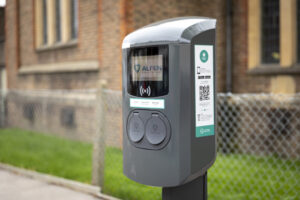What will be fuelling our future?
Given the amount of concern there’s been over the levels of Nitrogen Oxide coming from our vehicles, it’s no wonder that the UK government has stated its plan to ban the sales of new petrol and diesel vehicles by 2040. This is part of an initiative to clean up the nation! As a result of this, the electric car market has enjoyed a record year of sales. In 2017, each month saw more than 4,000 new electric vehicles registered in the UK. Compared to 2013, which saw 3,500 new electric vehicles registered in the entire year, and the change is clear.
With the government pushing more towards hybrids and electric cars, how will traditional fuel fare? Jamie Roberts of car servicing plans supplier, Lookers PLC, investigates.
Charging points
Originally, a lack of charging points meant many felt the electric vehicle market couldn’t compete with traditionally fuelled vehicles. In the past 12 months, our electric car charging infrastructure has evolved substantially to suit the lifestyles of many drivers. Following in the footsteps of other countries around the globe, like New Zealand who are rolling out easier-to-find charging stations, the UK has over 20 companies and organisations installing and running nationwide or regional electric car charging networks.
UK firm InstaVolt is working to install thousands of rapid charging points across the UK over the coming years. Locations include petrol forecourts, retail parks and business parks. Some researchers have also claimed they could have developed an ‘instantly rechargeable’ method that recharges an electric battery in the same time as it would take to fill a gas tank – a solution to one of the biggest headaches of electric vehicles.
Alongside this, BP announced that they would put more rapid charging points in their fuel stations from 2018. Oil firms are also recognising the potential for growth into the battery-powered vehicle market. A decision that follows in the footsteps of their rival, Shell, who have already invested money in several electric car infrastructure companies to install charging points at their service stations. According to The Guardian, the British oil firm, BP, is also investing $5 million (£3.5 million) in the US firm Freewire Technologies, which will provide motorbike-sized charging units at forecourts to top up cars in half an hour.
Tufan Erginbilgic, the chief executive of BP Downstream, said that: “EV charging will undoubtedly become an important part of our business, but customer demand and the technologies available are still evolving.”
All around the world, 2017 was proving to be a record year. In November 2017, global figures hit three million for the number of electric vehicles collectively on the roads – with China proving to dominate the market. Whilst oil firms such as BP expect the electric market to continue to rise, they hope the oil demand is not seriously affected – by cutting themselves a slice of the electric vehicle charging cake though, firms are covering their back if traditional oil demand does take a dip in line with the government’s plans to reduce harmful emissions and cut back on crude oil prices.
Fuel price variations
Reports from the RAC show how fuel prices are unsettled across the UK, thanks to so many different factor. From Brexit and harmful emissions to UAE conflict, fuel prices haven’t been steady for some time now, and a plan to eliminate petrol and diesel cars will not help steady the cost of fuel either.
Simon Williams, a fuel spokesman for the RAC, explained that “both petrol and diesel are now at their highest points for more than three years which is bound to be making a dent in household budgets”.
The RAC, alongside other experts in the industry, have been appealing to supermarkets to lower the price of their fuel for its customers. So far in 2018, three of the UK’s leading supermarkets have listened to the RAC’s call for lower fuel prices, and have reduced fuel prices by up to 2p per litre as of February 2018.
There’s also the concern over what Brexit could potentially do to the fuel prices. In 2014, the OPEC made a decision to increase the level of domestic fuel production in the UK, which led to a price drop to 98p in January 2016 — the lowest price of fuel per litre since the financial crisis in 2009. However, the UK still heavily relies on imported energy and fuel – around 38% of the UK’s total energy consumption is reliant on imported energy. Could our trading relationships be at risk after Brexit? And, of course, we must also consider how the uncertainty around the value of the pound could affect fuel costs following Brexit.
Brexit has already influenced the value of the pound. It experienced an immediate fall of 20% against the dollar after the UK voted to leave the European Union – causing fuel prices to increase by around 10p per litre and experts to raise concern that Brexit could mark the end of cheap fuel in Britain. The combination of higher crude oil prices and the devaluation of the pound mean Britain should expect higher fuel prices become the norm.
The price of fuel looks to remain uncertain for the future. One thing that appears to be for certain is that both the high fuel prices and attempts to improve air quality in the UK will have a positive impact on the EV market, with success forecast to continue to surge in the years leading up to 2040.















